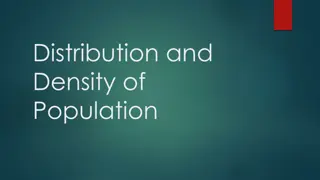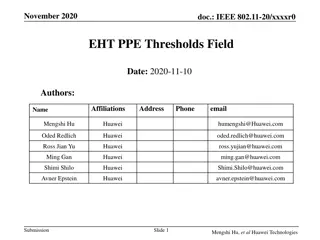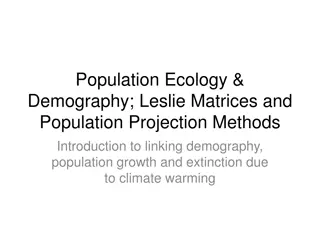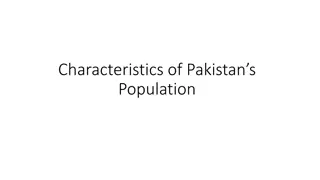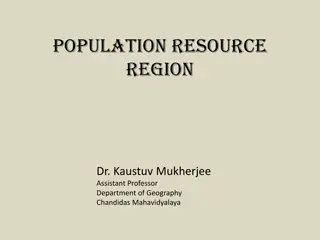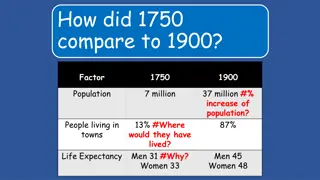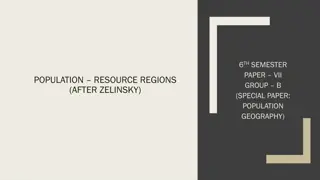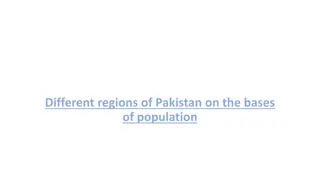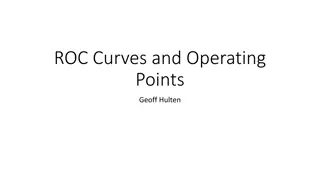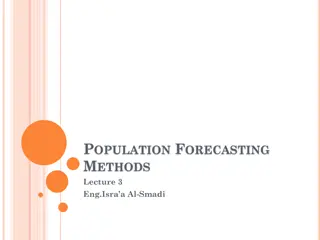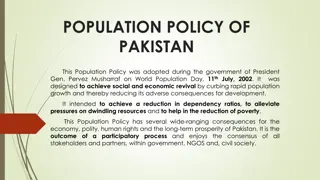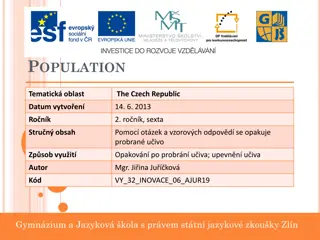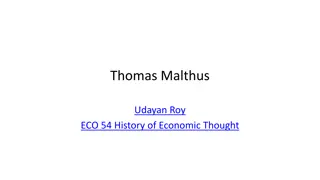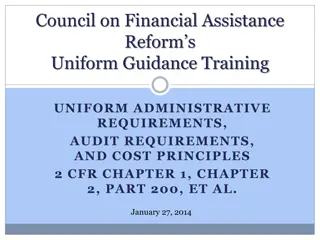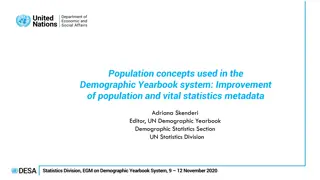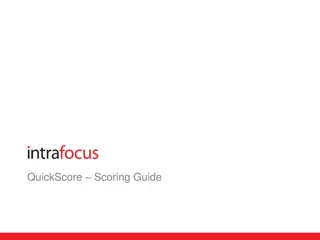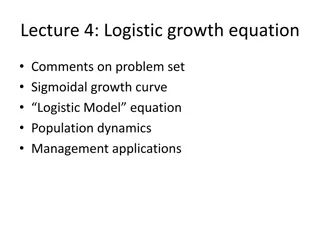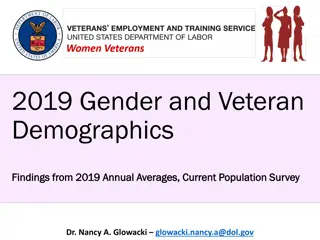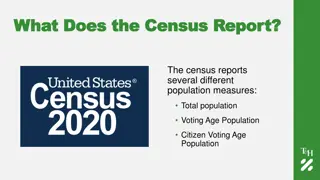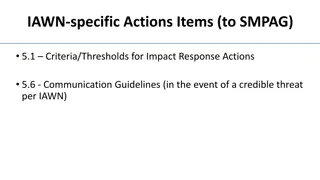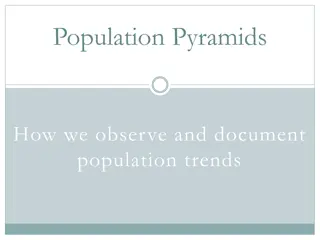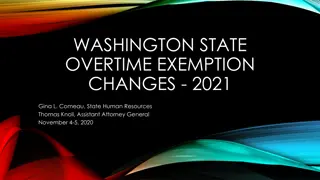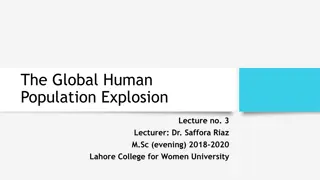Overview of the South African National Population Register
The South African National Population Register (NPR) is a vital system maintained by the Department of Home Affairs. It serves to record and update information on the country's resident population, issue identity documents, and handle related administrative tasks. The NPR has evolved over the years
2 views • 16 slides
Multimat-2 Experiment: Advancements in HL-LHC Collimator Technologies
The Multimat-2 experiment conducted by Jorge Guardia Valenzuela and the team at CERN focused on testing prototypes of HL-LHC collimators, including materials and coatings, to improve the robustness and performance under extreme conditions. The goals included deriving strength models, exploring failu
0 views • 13 slides
Distribution and Density of Population.
Population distribution and density are closely related concepts that describe the spatial patterns and proportional relationships of human populations across the world. Factors such as physical landscapes, socio-cultural influences, and demographic trends contribute to the regional disparities in p
9 views • 9 slides
Understanding Audiometric Worksheets: Frequency Mapping for Hearing Thresholds
Explore how audiometric worksheets represent hearing thresholds across frequencies, including patient details, equipment used, test results, and more. Learn about different audiogram forms, symbols used, and how to assess hearing loss type, degree, and laterality. Gain insights into interpreting aud
0 views • 58 slides
Introduction to IEEE 802.11-20 EHT PPE Thresholds Field
IEEE 802.11-20 standard defines the Nominal Packet Padding values and Pre-FEC Padding Factors for PE fields in 11ax. The selection of Nominal Packet Padding values is crucial and can be determined using specific methods, including PPE Thresholds Present subfield. The PPE Thresholds field contains in
0 views • 14 slides
Understanding Population Ecology and Demography Through Leslie Matrices
Explore the critical aspects of population ecology and demography, focusing on factors influencing abundance, population growth, regulation, and the impacts of climate change. Learn about population projections, growth models, age-structured populations, and data requirements for estimating populati
4 views • 35 slides
Population Characteristics and Control in Pakistan
The population of Pakistan exhibits high birth rates and declining death rates, leading to a significant natural increase. Urbanization is rapidly occurring while literacy rates remain low. There is a crucial need for population control to ensure economic progress and prosperity. However, addressing
0 views • 7 slides
University Procurement Overview August 2020
This detailed document covers various aspects of procurement in the University of Strathclyde, including legislation, EU procurement principles, Scottish procurement context, thresholds, procedures, and risks associated with non-compliance. It emphasizes adherence to EU principles, different spend t
0 views • 37 slides
Factors Influencing Population Change in Chapter 24
This chapter explores key factors affecting population change including food supply, technology, healthcare, war, status of women, and education. It discusses how improved technology, healthcare advancements, and food availability impact population growth, as well as the demographic transition model
0 views • 40 slides
Impact of Human Population Growth on Environment and Welfare
The rapid growth of the human population is placing immense pressure on the environment, leading to increased demand for resources like food, water, and shelter. The effects of human activity on the environment have escalated significantly over the years due to population expansion. High birth rates
0 views • 8 slides
New Jersey State Library Directors Training: Purchasing Basics and Bid Thresholds
Explore the essential topics covered in the New Jersey State Library Directors Training on Purchasing Basics, including bid threshold exceptions, local public contract laws, Qualified Purchasing Agent certification requirements, and the importance of not dividing contracts to bypass bid thresholds.
0 views • 28 slides
Academic Senate Resolutions and Low-Cost Thresholds in Higher Education
The Academic Senate addresses the adoption of open educational resources (OER) and low-cost materials to support academic freedom and compliance with legislative requirements. The resolution discusses the definition of low-cost resources and the variability among California Community Colleges in set
2 views • 9 slides
Understanding Purchasing Rules and Thresholds in Government Contracts
Buying in the public sector differs from the private sector due to policies dictating purchases. General rules on thresholds prevent dividing purchases to meet discretionary buying limits. Proper documentation is required for orders ranging from $1-$10,000 to over $35,000. New York State's preferred
1 views • 17 slides
Introduction to Sampling in Statistics
Sampling in statistics involves selecting a subset of individuals from a population to gather information, as it is often impractical to study the entire population. This method helps in estimating population characteristics, although it comes with inherent sampling errors. Parameters represent popu
2 views • 24 slides
Understanding Population-Resource-Region Relationship: A Geographical Perspective
Explore the intricate relationship between population, resources, and regions through a geographical lens. Delve into classifications based on population, resources, and technology, with examples from different countries and regions. Discover the concepts of optimum population, over-population, and
1 views • 11 slides
Understanding Demography: Population Trends and Analysis
Demography is the study of population size, distribution, and composition, encompassing elements such as mortality, natality, migration, and demographic forces. Population census plays a crucial role in collecting and analyzing demographic data, with methods like De Jure and De Facto census. Inter-c
6 views • 21 slides
Comparing 1750 to 1900: Population Growth in Britain
The population of Britain saw a significant increase between 1750 and 1900. In 1750, the population was 7 million, and by 1900, it had grown to 37 million. This represented an 87% increase. The number of people living in towns also rose from 13% to a higher percentage. Factors contributing to this g
0 views • 6 slides
Population Resource Regions and Zelinsky's Classification
Geographers have long studied the relationship between population growth and resource adequacy, leading to the concept of Population Resource Regions (PRR) by W. Zelinsky. Zelinsky identified five types of PRR based on population-resource ratios, ranging from Type A with high resource utilization po
0 views • 8 slides
Population Distribution in Different Regions of Pakistan
The population distribution in Pakistan varies significantly among different regions, with certain provinces like Punjab and Sindh having higher population densities compared to Baluchistan and FATA. The rural areas are also categorized into different population density regions based on the number o
0 views • 14 slides
Understanding ROC Curves and Operating Points in Model Evaluation
In this informative content, Geoff Hulten discusses the significance of ROC curves and operating points in model evaluation. It emphasizes the importance of choosing the right model based on the costs of mistakes like in disease screening and spam filtering. The content explains how logistical regre
7 views • 11 slides
Methods of Population Forecasting for Urban Development
Designing water supply and sanitation schemes for cities requires accurate population forecasting. Factors influencing population changes include births, deaths, migration, and annexation. Various methods like Arithmetic Increase, Geometric Increase, and Ratio Method are used to predict population g
4 views • 24 slides
Understanding the Concept of Population and Unit Stock
The concept of population revolves around all organisms of the same species living in a specific area capable of interbreeding. It is essential to differentiate between sample populations and real populations to accurately study their attributes such as birth rates, death rates, and spatial dimensio
0 views • 15 slides
Population Policy of Pakistan: Vision, Goals, and Strategies
The Population Policy of Pakistan, adopted in 2002, aims to stabilize the population by 2020 through a focus on reducing fertility rates and promoting family planning. The policy outlines goals such as achieving a balance between resources and population, increasing awareness of rapid population gro
0 views • 11 slides
Exploring Population Data of the Czech Republic
The data presents insights into the population of the Czech Republic, including demographics, language distribution, religious beliefs, literacy rates, life expectancy, and urban population percentages. The population pyramid reveals a dominance of people in the age group of 20-49, with longer life
0 views • 8 slides
Thomas Malthus and His Theory on Population Growth
Thomas Robert Malthus, an influential economist, proposed a theory on population growth in the 18th century. His theory suggested that population grows exponentially while food production increases at a slower rate, leading to inevitable food scarcity. Malthus also discussed the concept of preventiv
2 views • 19 slides
Reforming Audit Requirements for Federal Awards
This presentation outlines the major policy changes in the government-wide requirements for auditing Federal awards under the Single Audit Act Amendments of 1996. It discusses the transition from OMB Circular A-133 to Subpart F-Audit Requirements in 2 CFR Part 200, focusing on targeting audit requir
1 views • 34 slides
Louisiana Parish Population Statistics 2010
Louisiana Parish Population Statistics for the year 2010 reveal varying population numbers across different regions. The data provides insights into demographic changes and trends over the past decade. The total population change by parish and age group highlights shifts in different age brackets. T
0 views • 42 slides
Improvement of Population and Vital Statistics Metadata in the Demographic Yearbook System
The Demographic Yearbook system focuses on enhancing population and vital statistics metadata to ensure accurate and concise reflection of population concepts across 230+ countries. It involves annual collection of official national population estimates, vital statistics, and UN international travel
0 views • 16 slides
Understanding QuickScore Scoring Guide
QuickScore Scoring Guide explains how scoring is assigned based on user-defined thresholds and breakpoints. Users set values for goals, determine if higher or lower values are better, and establish scoring thresholds for different performance levels. The guide covers various scoring methods, includi
0 views • 10 slides
Understanding Logistic Growth in Population Dynamics
Explore the logistic growth equation and its applications in modeling population dynamics. Dive into the concept of sigmoidal growth curves and the logistic model, which reflects population growth with limits. Learn how to calculate population change using the logistic growth equation and understand
0 views • 26 slides
Insights on 2019 Gender and Veteran Demographics
Analysis from the 2019 Annual Averages of the Current Population Survey reveals significant statistics regarding gender and veteran populations in the United States. Data indicates that veterans comprise 7.5% of the overall population, with women veterans totaling almost 2 million. Women veterans ma
0 views • 48 slides
Overview of Population Measures and District Data from Census Reports
The census reports various population measures including total population, voting age population, and citizen voting age population. The data includes breakdowns by ethnicity for each trustee district. Changes in voting and citizen voting age population percentages are also provided. Data is sourced
0 views • 4 slides
3GPP TSG-RAN-WG4 Meeting #96e Electronic Meeting August 17th-28th, 2020
This document discusses various topics related to PMPR reporting values, absolute and relative PMPR trigger thresholds, and the relationship between them. It covers agreements reached on defining reporting values, trigger thresholds, and configurations for event-triggered reporting scenarios within
0 views • 8 slides
Criteria and Thresholds for Impact Response Actions by IAWN/SMPAG
Discussion of criteria and thresholds for impact response actions by IAWN/SMPAG, including warning thresholds based on size and probability of impact, recommendations for terrestrial preparedness planning, and initiation of mitigation mission options. The rationale behind these criteria aims to stri
0 views • 9 slides
Understanding Population Pyramids for Analyzing Population Trends
Population pyramids are graphical illustrations that showcase the distribution of age groups within a population, segmented by gender. By observing and documenting the patterns of population pyramids, one can discern trends such as rapid growth, slow growth, or negative growth, which are influenced
0 views • 7 slides
Updates in Procurement and Finance Forum May 2018
This content covers key updates in procurement and finance discussed at the Finance Forum in May 2018. It includes changes in legislation, guidance, thresholds, and practices, emphasizing EU principles, thresholds, electronic communication, contract registers, and supplier setup protocols. Notably,
0 views • 34 slides
Washington State Overtime Exemption Changes 2021 Overview
Washington State has outlined overtime exemption changes for 2021, including minimum wage act requirements, exemptions from overtime pay requirements, qualifying criteria for exemptions, new salary thresholds effective January 1, 2021, phased-in salary thresholds, and application of the salary thres
0 views • 11 slides
Year-End Closing Procedures for Fiscal Year 2021
Conducting the fiscal year-end closing procedures for FY2021 involves tasks such as finishing all current year processing in the EIS system, ensuring items are properly added to EIS based on the receipt date, running reports to verify capitalization thresholds are met, and generating recommended rep
0 views • 17 slides
Maine Workforce and Population Trends Analysis 2014-2024
Maine's workforce and population outlook from 2014 to 2024 reveals a decline in births, resulting in an aging population and workforce imbalance. The state faces challenges due to low birth rates, negative natural population change, and minimal net migration, impacting labor force growth and total p
0 views • 31 slides
The Global Human Population Explosion: Causes and Implications
The lecture explores the rapid increase in the global human population post-World War II, analyzing factors such as birth rates, mortality rates, and life expectancy. Various counterarguments are presented, including the debate on population growth benefits, ethical concerns over reproductive interf
0 views • 20 slides


